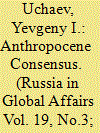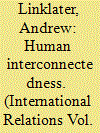| Srl | Item |
| 1 |
ID:
180801


|
|
|
|
|
| Summary/Abstract |
Humanity is facing the highest risk of global existential catastrophe in its
history. What should be done to ensure effective international cooperation
for the sustainable survival of humankind? The article posits that the main
obstacles to international cooperation lie in the field of ideas and mentality.
To overcome these obstacles, a new unifying metanarrative is proposed,
the Anthropocene consensus. It means taking human survival not just as
a goal or interest, but as an ethical Absolute, which serves as a reference
point for assessing all other value systems. Since different forms of social
organization, including at the international level, are unequal in terms
of their impact on the prospects for human survival, the Anthropocene
consensus implies certain principles of the global socio-political order: a
non-absolute nature of sovereignty, a dialogue of countries with different
political regimes, justice, and the priority of global security over national
security. The conclusion suggests that the Anthropocene consensus has a
reasonable chance of theoretical and practical success.
|
|
|
|
|
|
|
|
|
|
|
|
|
|
|
|
| 2 |
ID:
092042


|
|
|
|
|
| Publication |
2009.
|
| Summary/Abstract |
Kenneth Waltz's structural realism abstracts the international political domain from other spheres of social interaction to explain recurrent patterns of competition and conflict across the millennia. There are similarities between the structural realist 'grand narrative' and the process-sociological approach developed by Norbert Elias. But the latter supported 'high-level synthesis' in the social sciences in order to understand how relations between material, ideational and emotional forces have contributed to the growth of human interconnectedness. The analysis contended that one of the purposes of the social sciences is to increase knowledge of how humans can gain control of the processes that bind them together in global networks of interdependence. Elias was opposed to partisan inquiry such as Kant's notion of a universal history with a cosmopolitan intent. But a shared emphasis on how humans have developed the capacity to cause distant harm reveals how future grand narratives can combine the analysis of the growth of interconnectedness with the ethical argument for greater transnational solidarity.
|
|
|
|
|
|
|
|
|
|
|
|
|
|
|
|